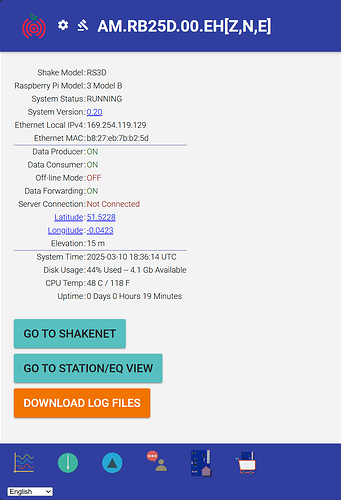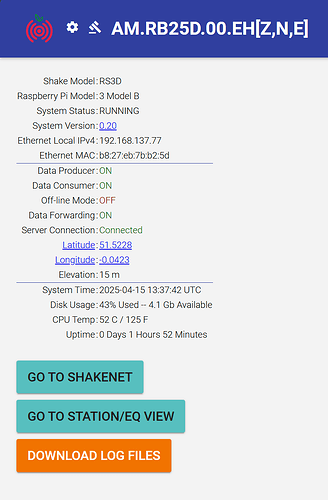Hello pengfz,
First, let me provide our dedicated manual page for the Shake UDP protocol: Raspberry Shake Data Producer UDP Port Output.
If you are losing a few packets, that could be normal as, by definition, UDP does not guarantee 100% receipt of data packets.
However, from what you write, it appears that you are losing quite a lot of packets. Is this correct? Any other detail you can provide will surely help.
Thank you for the logs. From them, this one emerges as a prominent issue:
2025 056 15:45:16>> No Data has been received from the MCU in 12 read attempts.It appears the MCU is not transmitting data. This is a fatal condition and should be investigated if this condition persists!
2025 056 15:45:16>> Data has been successfully received, fatal condition resolved.
2025 056 15:45:16>> internal error: buffer overflow! cannot process read data...
2025 056 15:45:16>> buf: pî_k#I]ŠˆE�Qê�kÔQûÿOkˆ��M¤eY27Q Ê”QÐ�E
2025 056 15:45:16>> 'á�E¤EY`ƒaQ
2025 056 15:45:16>> yœÀ
As you can see, error files contain some “gibberish” mixed with “no data received” errors.
I would recommend checking if the current power supply that is being used is continuing to deliver a stable voltage between 5.0 and 5.2V and a current of at least 2.5A at all times, as a decrease in power could lead to data services interruption. If you have another Pi power supply that you know is in working condition, please try to exchange the current one with that, and see if the Shake now properly works for longer. Also, remember to try different wall sockets.
A second check that you can do is to see if all the connections between the sensor, the blue Shake board, and the Pi board are still solid and free from dirt or any other element that could compromise transmission. If you decide to disassemble the Shake when doing this, please make sure you are using proper ESD (ElectroStatic Discharge) protection (such as gloves, etc.), as electronics do not like static electricity too much.
As a last resort, and if all these checks come out as positive, then I would recommend re-burning the microSD card again (or using a different microSD) after formatting and erasing all its data/partitions first (you can use DISKPART for this as it is very efficient), and see how the Shake behaves with the newly installed system, removing potential issues derived from corrupted files. I will leave the burning instructions link here for your convenience: microSD card topics
For anything else, I remain available.


